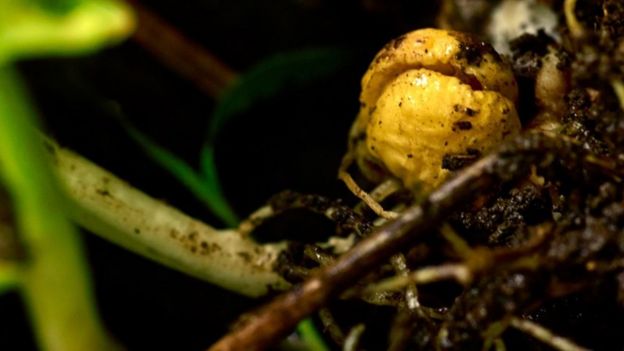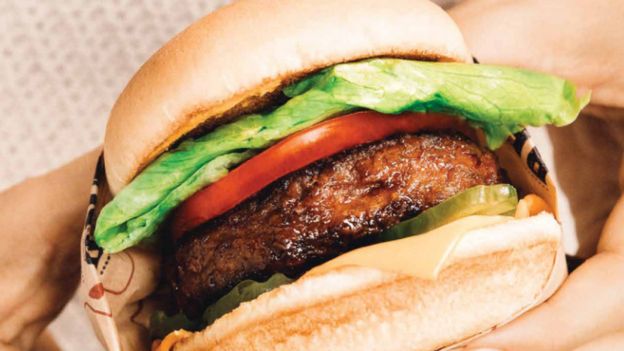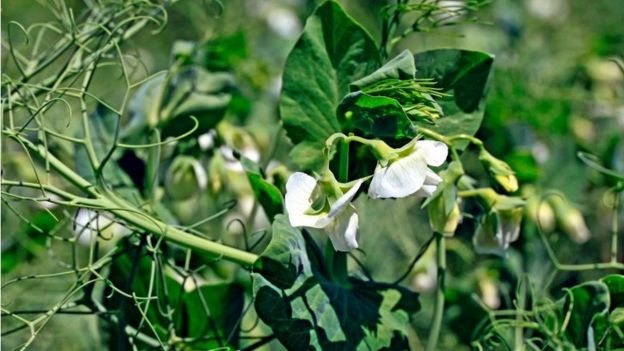When Tyler Lorenzen first started to sell protein powders derived from peas he received some "odd looks".
As a former professional athlete - he was with the NFL's New Orleans Saints until 2011 - he knew a lot about nutrition and believed in pea protein, but had trouble convincing others about its benefits.
In 2013 he was working for his family's business, Puris, based in Minneapolis, Minnesota, which had just developed its own pea protein.
But when he tried to sell them, customers were dubious: "What are you guys doing... protein from peas? I didn't even know peas had protein," they would tell him.
The firm also had to battle people's childhood memories of eating peas, which did not necessarily endear them to the product.
"Most people's memories as a kid of eating peas is not delightful or delicious," he says.
But the firm's timing turned out to be good. Health conscious consumers were looking for alternatives to dairy and to soya.
And over the years that has turned into a boom, from meat-free burgers to dairy-free cheese, you can find pea proteins in all sorts of foods - you can even drink pea "milk".
Historical trends
For decades soya beans have been the main supply of plant-based protein, but since the turn of the millennium, it has been falling out of favour.
Some people are simply allergic to soya, so they needed something else.
Other consumers, particularly in Europe, were put off by the fact that soya protein is often derived from genetically modified soya crops.
 Image copyrightPURIS
Image copyrightPURISAlso hexane, a solvent derived from oil, is typically used to extract protein from soya beans. While the industry says virtually all of the chemical is eliminated before soya protein reaches the market, for some consumers the use of hexane was a deal breaker.
So pea protein, which doesn't require chemicals during the production process, has become an attractive alternative.
Also the source crop, yellow field peas, are plentiful and liked by farmers.
"Peas are a real nice crop, they're pretty easy," says Bill Gehl, whose family has been farming in southern Saskatchewan, Canada, for three generations.

- Tech-savvy stamp collectors energise an old hobby
- High-tech ways to keep employees happy
- The vegan fabrics that fashion is betting on
- How tracking menstrual cycles helps women in sport
- The robo racing cars accelerating driverless tech

The relatively dry weather suits the production of fields of pulses - peas, beans and lentils are common in his province.
Bill says farmers like the yellow field pea because, like other legumes, it transfers nitrogen from the air into the soil, making it more fertile.
There is also a financial incentive: "The big thing is you can make money out of it," says Mr Gehl.
Although peas don't yield as much produce as wheat for every acre, the price per bushel is typically higher and they don't need as much fertilizer to grow.
"They [peas] haven't been as susceptible to the downtown in the global economy as maybe some of the other pulses," he adds.
 Image copyrightBEYOND MEAT
Image copyrightBEYOND MEATThe demand for Bill's peas is likely to be supported by the boom in demand for pea protein.
Henk Hoogenkamp, an adviser to food companies on pea protein technology, expects the industry to produce between 340 and 350 tonnes of pea protein next year - an increase of a third on this year.
Processing plants are opening at a rapid rate to supply demand. Over the summer Puris received a $75m (£60m) investment from US food giant Cargill, which will allow it to double its production of pea protein with a new plant in Minnesota.
The early demand was for pea protein was in powder form - used as a supplement in shakes and drinks.
But in recent years it has been incorporated in more and more products.
"The market has taken off like nothing you have seen before," says Mr Hoogenkamp, who advises food companies on pea protein technology.
He says he gets a least one phone call a week from companies looking to get into pea protein.
There is demand from firms making plant-based "meat" products and dairy-free yoghurts, cheese and milk.

Perhaps the best known is Beyond Meat, which makes plant-based meat products, and this year floated on the stock market, worth $1.5bn.
Mr Hoogenkamp says the rise of plant-based proteins has caught the traditional, or legacy, food giants by surprise.
"Only three years ago the legacy industry was laughing at these companies. They are not laughing any more."
"The millennial generation has basically woken up and their tastes are rather dramatically changing in affluent countries, substituting animal for plant-based proteins."
Green support
Environmental groups support plant-based proteins, hoping that their rise will curb meat consumption.
"The world's top scientists have consistently said we need to more than halve our meat consumption to prevent climate breakdown," said Richard George, head of forests at Greenpeace.
"Pea protein is undoubtedly one option among many. Changing our eating habits won't be easy, but the more options we have, the better our chance of success."
But the rise of pea protein needs to be kept in perspective.
Global meat consumption is running at 330 million tonnes a year, a million times greater than the annual output of pea protein.
And with meat consumption expected to continue to grow, the humble pea is likely to remain pretty humble for a while yet.
source: BBC



